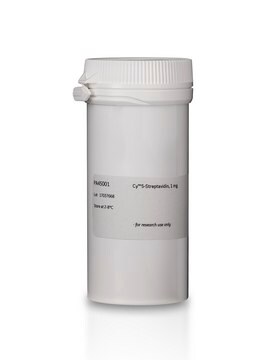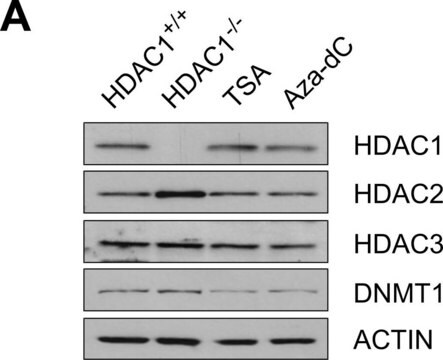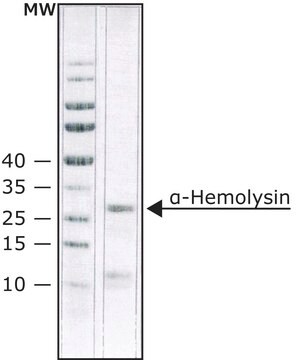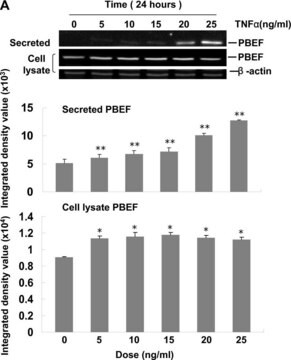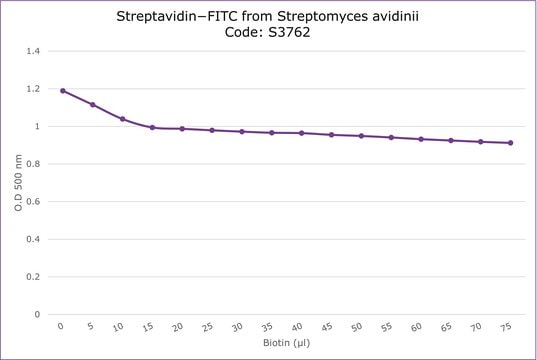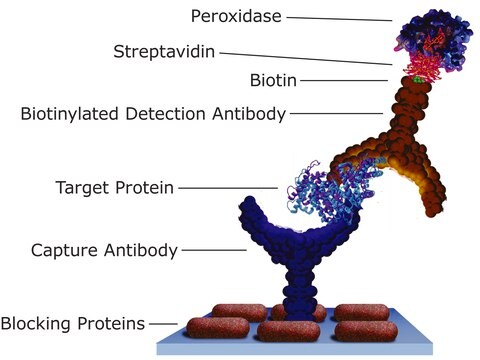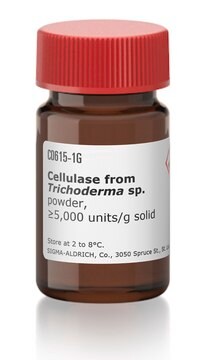GEPA43001
Cy®3-Streptavidin
Cytiva PA43001
Iniciar sesiónpara Ver la Fijación de precios por contrato y de la organización
About This Item
Código UNSPSC:
12352203
NACRES:
NA.46
Productos recomendados
Formulario
solid
envase
pkg of 1 mg
fabricante / nombre comercial
Cytiva PA43001
color
Blue
temp. de almacenamiento
2-8°C
Categorías relacionadas
Descripción general
Cy3-Streptavidin
Cy3-Streptavidin
Cy3-Streptavidin
- Streptavidin conjugated to a range of fluorescent dyes for use in in situ hybridization and flow cytometry.
- High specificity reagents.
Aplicación
Suitable for use in the fluorescent analysis of biotinylated samples.
Características y beneficios
- Streptavidin conjugated to a range of fluorescent dyes for use in in situ hybridization and flow cytometry.
- High specificity reagents.
- Convenient: no need to label in-house
- Streptavidin conjugated to Cy2, Cy3, or C5 fluorescent dyes
Almacenamiento y estabilidad
Please be aware this product may be shipped 90 days before the expiration date. For more information on the batch specific expiration date, please contact technical service.
Nota de análisis
To view the Certificate of Analysis for this product, please visit www.cytiva.com.
Información legal
CyDye:
Cy3B: This product is manufactured under an exclusive license from Carnegie Mellon University and is covered by US patent number 6,133,445 and equivalent patents and patent applications in other countries.
CyQ (or Cy5Q or Cy7Q): These products are covered under US patent number 6,828,116 and equivalent patents and patent applications in other countries in the name of Cytiva.
CytoCy5S: The use of this product in an NTR gene reporter assay is the subject of US patent number 7,579,140 in the name of Cytiva.
CypHer5E: This product or portions thereof is manufactured under license from Carnegie Mellon University and is covered by US patent number 7,615,646.
Cy and CyDye, are - trademarks of Cytiva or one of its subsidiaries.
The purchase of CyDye products includes a limited license to use the CyDye products for internal research and development but not for any commercial purposes. A license to use the Cy and CyDye trademarks for commercial purposes is subject to a separate license agreement with Cytiva. Commercial use shall include:
1. Sale, lease, license or other transfer of the material or any material derived or produced from it.
2. Sale, lease, license or other grant of rights to use this material or any material derived or produced from it.
3. Use of this material to perform services for a fee for third parties, including contract research and drug screening.
If you require a commercial license to use the Cy and CyDye trademarks please contact LSlicensing@cytiva.com.
If you require a commercial license to use this material and do not have one, return this material unopened to Cytiva Bio-Sciences AB, Bjorkgatan 30, SE-751 84 Uppsala, Sweden and any money paid for the material will be refunded.
Cy3B: This product is manufactured under an exclusive license from Carnegie Mellon University and is covered by US patent number 6,133,445 and equivalent patents and patent applications in other countries.
CyQ (or Cy5Q or Cy7Q): These products are covered under US patent number 6,828,116 and equivalent patents and patent applications in other countries in the name of Cytiva.
CytoCy5S: The use of this product in an NTR gene reporter assay is the subject of US patent number 7,579,140 in the name of Cytiva.
CypHer5E: This product or portions thereof is manufactured under license from Carnegie Mellon University and is covered by US patent number 7,615,646.
Cy and CyDye, are - trademarks of Cytiva or one of its subsidiaries.
The purchase of CyDye products includes a limited license to use the CyDye products for internal research and development but not for any commercial purposes. A license to use the Cy and CyDye trademarks for commercial purposes is subject to a separate license agreement with Cytiva. Commercial use shall include:
1. Sale, lease, license or other transfer of the material or any material derived or produced from it.
2. Sale, lease, license or other grant of rights to use this material or any material derived or produced from it.
3. Use of this material to perform services for a fee for third parties, including contract research and drug screening.
If you require a commercial license to use the Cy and CyDye trademarks please contact LSlicensing@cytiva.com.
If you require a commercial license to use this material and do not have one, return this material unopened to Cytiva Bio-Sciences AB, Bjorkgatan 30, SE-751 84 Uppsala, Sweden and any money paid for the material will be refunded.
Cy is a registered trademark of Cytiva
Palabra de señalización
Danger
Frases de peligro
Consejos de prudencia
Código de clase de almacenamiento
13 - Non Combustible Solids
Elija entre una de las versiones más recientes:
Certificados de análisis (COA)
Lot/Batch Number
Lo sentimos, en este momento no disponemos de COAs para este producto en línea.
Si necesita más asistencia, póngase en contacto con Atención al cliente
¿Ya tiene este producto?
Encuentre la documentación para los productos que ha comprado recientemente en la Biblioteca de documentos.
Los clientes también vieron
P Grigaravicius et al.
Cell death and differentiation, 23(3), 454-468 (2015-09-19)
Endoplasmic reticulum (ER) stress, defective autophagy and genomic instability in the central nervous system are often associated with severe developmental defects and neurodegeneration. Here, we reveal the role played by Rint1 in these different biological pathways to ensure normal development
Aiping Lu et al.
FASEB journal : official publication of the Federation of American Societies for Experimental Biology, 35(3), e21378-e21378 (2021-02-11)
The decline of muscle regenerative potential with age has been attributed to a diminished responsiveness of muscle progenitor cells (MPCs). Heterochronic parabiosis has been used as a model to study the effects of aging on stem cells and their niches.
Aiping Lu et al.
Human molecular genetics, 23(18), 4786-4800 (2014-05-02)
Duchenne muscular dystrophy (DMD) patients lack dystrophin from birth; however, muscle weakness becomes apparent only at 3-5 years of age, which happens to coincide with the depletion of the muscle progenitor cell (MPC) pools. Indeed, MPCs isolated from older DMD
Nuestro equipo de científicos tiene experiencia en todas las áreas de investigación: Ciencias de la vida, Ciencia de los materiales, Síntesis química, Cromatografía, Analítica y muchas otras.
Póngase en contacto con el Servicio técnico
